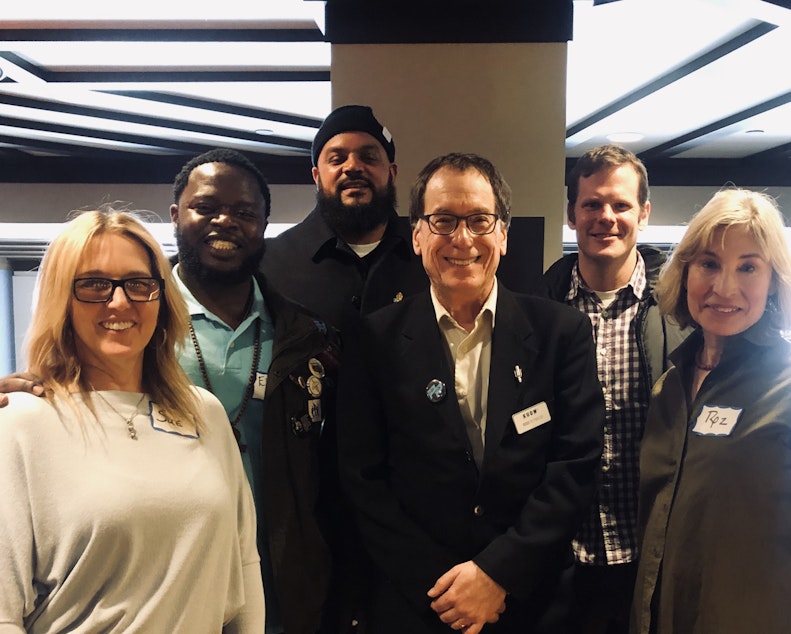Punishment and penance: Ask a person who's been incarcerated

Individuals with a history of incarceration confront mixed reactions from the public and face difficulties with finding employment and housing as well as dealing with economic sentencing after incarceration.
KUOW's Ask A® program partnered with What’s Next Washington, an organization which consists of "formerly incarcerated individuals and allies working together to improve our ability to reintegrate into society,” to elevate the stories and foster understanding of formally incarcerated individuals in society.
The event brought together a group of 12 individuals curious to sit down with 12 people who’ve been formally incarcerated to learn of their experiences.
This event took place at Hotel Andra in downtown Seattle on March 10.
Interview highlights have been lightly edited for clarity
What was life like after incarceration?
Jessica, program manager at New Connections
“Life after incarceration [was] a little more difficult than I anticipated. I had never been in trouble in my life before. Now, doing simple things like finding housing is difficult because of background checks.
"When people talk about crime and criminals and bad guys, I carry a fear of judgement on my shoulders.”
Jason, project manager for King County Superior Court
“The economic sentence afterwards impacted me in such a way that it was difficult to survive. That was the negative part of that impact, but the way it impacted me positively was building resiliency to figure out how to navigate hoops within the system.”
Angie, works at the Office of Corrections Ombuds
"When I first was released, there were a lot of complications as far having to go check in with the Department of Corrections, having to get into treatment, having to do all these things that the Department of Corrections wants you to do — but at the same time I don’t have a license.
“Unfortunately, I still can’t rent an apartment because I’m a felon. I still can’t go and get whatever job I want because I’m a felon."
Eddie Howard, founder of Progress Pushers
“I went to prison as a teenager and wasn’t released until I was 31. I’m 34 now.
"I would say that adjustment is difficult after getting out. When you have been incarcerated for any amount of time, but definitely for a substantial amount of time, just adjusting to society was completely strange, difficult, nerve-wracking.”
Alex, co-founder and CEO of Corio
“It changed everything in my life. I went to prison late in life because I made the biggest mistake of my life. I drank, I drove, and two people died.
"It wasn’t anything I had planned on. I certainly wasn’t voted most likely to go to prison, but it happened.
"It didn’t just happen to me, but it happened to hundreds of people. Certainly all of my family paid a huge price, but more importantly, the biggest price was paid by the people who died and their families, and of course, they suffer every day.”
What should change to help people better reintegrate into society?
Dawn, chief administrator for a local nonprofit
"I honestly think that the most helpful piece that could be implemented for people coming out of incarceration is to have some sort of mentorship program.
"I know for myself, it was just really intimidating — the idea of having to tell people my story that had never been there.
"It was just more comfortable, the first time I got out of prison, to go back to people who knew my deal and were just as bad so I didn’t have to worry about that judgement or condemnation."
Sue Mason, executive director of What’s Next Washington
"I’m still being denied housing and employment to this day, 16 years later. It doesn’t matter what I accomplish, it doesn’t matter what degrees I get, it doesn’t matter what certifications or what capabilities I have, what references are listen on my resume. It can all be negated by that background check.
"We need to end hiring bans in sectors like healthcare and finance; we need to hire people and give them an opportunity.
"Statistically — employers are always worried that people who are going to steal on the job — the people that will steal on the job are people without a conviction history. So we’re a really safe bet and you need to hire us."
Eddie Howard, founder of Progress Pushers
“Incarceration definitely didn’t teach me anything. It was the individuals who were incarcerated that I learned from on the importance of getting out and becoming a better person, on the importance of preparing yourself mentally."
"Going to prison at a very young age, and growing up in prison, they didn’t have an abundance of classes on what to say during a job interview upon release in order to secure a position.
"Where are the entrepreneurship classes where I could actually create my own career opportunity? Then I could actually help other individuals get employed. Where is that kind of job training at?"
Produced for the web by Brie Ripley




